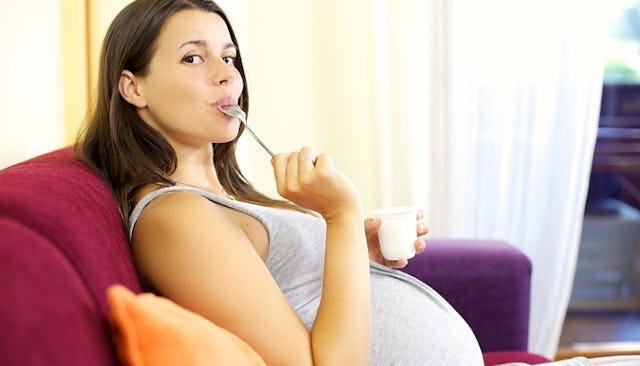The Case For Being Allowed To Eat And Drink During Labor

Imagine running a marathon and being told you can’t eat or drink for several hours before. I haven’t run a marathon, but I’ve given birth (twice!), and if someone had told me I wasn’t allowed to eat at all during those grueling hours in which my body opened up, turned itself inside out, and endured contractions that made me feel like I was going to die, I would have slapped them square across the face.
And yet, many hospitals in America have a firm “no food or drink during labor” policy. Yep, ice chips by the bucket, but no solid food in sight.
I gave birth outside of the hospital setting with a midwife, and some of the policies that hospitals dictate didn’t apply in my case. Not only was I allowed to eat, but I was actually encouraged to.
During the early stages of my first labor, when it was “Have a contraction, and then wait for 15 minutes for another,” I enjoyed a hot egg and cheese sandwich. With my second labor, a nice big bowl of cereal and milk. Comfort foods, I suppose — and I wanted all the comfort I could get for what was to come.
Toward the end of my first labor, my midwife told me I should eat something because I hadn’t eaten since my labor had begun eight hours before. I was having one insane contraction on top of the other at that point, and I told her that there was no way I could put anything into my body. But she pressed the issue, saying even soup or juice would suffice — anything to get some calories in me.
I ate five bites of soup, and promptly threw up. No big deal: My midwife was still happy that I’d gotten anything into my system at all, and it was shortly after this that I got a second wind and gave birth to my son.
A few years later, I accompanied a friend to her birth in a hospital with an MD. Obviously, her birth was different than mine (and equally good for her: I believe all women should give birth how and where they feel most comfortable). But one of the differences that stood out to me was that she was denied food and drink during labor.
And she was hungry too! She consumed ice chips like it was her job, but that was it. I felt bad and was tempted to sneak her a granola bar.
Thankfully, the idea of starving women during labor is being reevaluated, by medical professionals no less. In 2015, the American Society of Anesthesiologists (ASA) came out with a recommendation that laboring women should, in fact, be allowed to eat and drink during labor, whenever possible.
It should be noted that the reason that the “no food or drink during labor” policy came about in the first place was because of the concern that the laboring mother might aspirate or inhale food into her lungs (and potentially increase her risk of pneumonia, among other concerns) in the event that she required anesthesia.
So it’s a pretty big deal that the anesthesiologists themselves released this statement.
The ASA states that after combing through 385 studies published after 1990, they found almost no risk posed by a mom eating or drinking during labor. In fact, they found that withholding food and drink actually lengthened a mother’s labor.
Let me tell you: Longer labors are not something any of us want.
In addition to depleting much-needed energy stores, the ASA explains that not feeding laboring moms can cause emotional distress, which could potentially move blood away from the uterus and placenta and also contribute to lengthier labors and fetal distress.
Not eating causing emotional stress? No duh. It’s pretty much akin to torture to make a woman abstain from eating or drinking when she’s doing the hardest dang work of her life.
The ASA does say that there are certain high-risk women who do need to abstain from eating and drinking during labor, like those with eclampsia and preeclampsia, for example. But for healthy, low-risk women, these rules should basically be thrown out the window (well, they don’t use those words exactly, but you get the picture).
This report does emphasize, of course, that all laboring women should talk to their health care providers to find out if eating and drinking during labor is safe for them.
After informally polling a couple of friends who had recently given birth, it sounded like only a small number of hospitals have begun to change their policies based on this report and that many hospitals simply have not caught up yet.
Let’s hope that they will, because dammit, when a woman needs to eat, she needs to eat, especially when she’s birthing a freaking baby.
If you are in a situation where you’ve been told you’ll be denied food during labor, but you think you fall into the category of someone who is low-risk, maybe print out that study from the ASA and bring it to your next prenatal appointment? It can’t hurt to ask and discuss.
And if you do get permission to munch on a piece of toast or a nibble a protein bar during labor, you’ll be extremely grateful for every bite, even if you end up barfing up half of it a few minutes later.
Trust me: You’ll need every single minuscule calorie you can get while you do the most challenging, amazing, life-changing, and physically demanding work of your life.